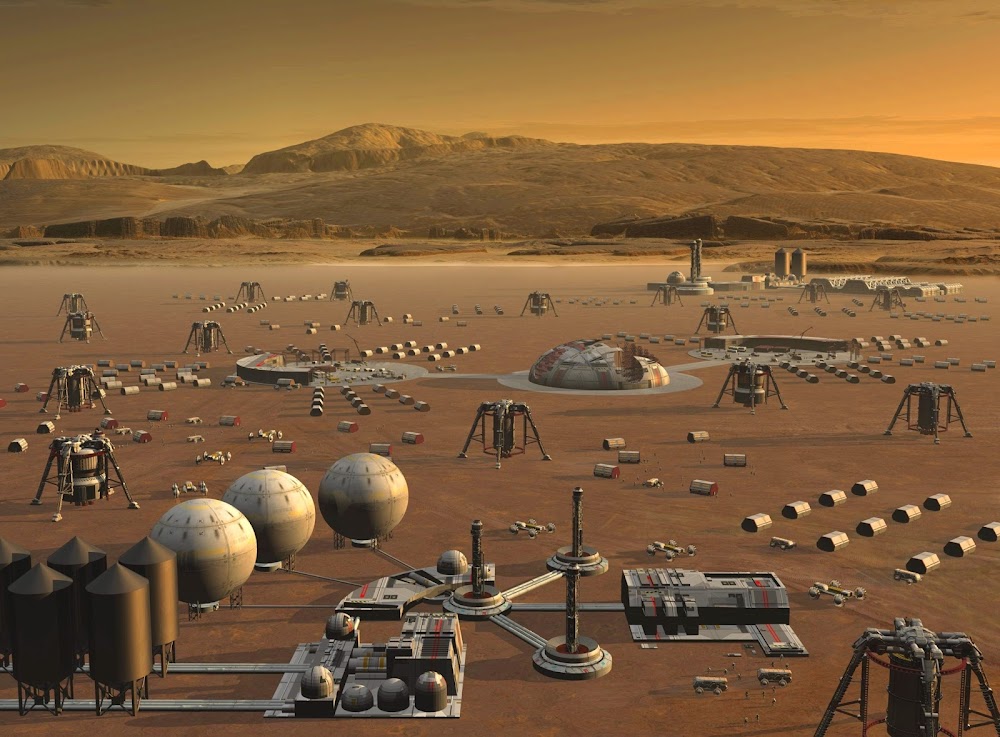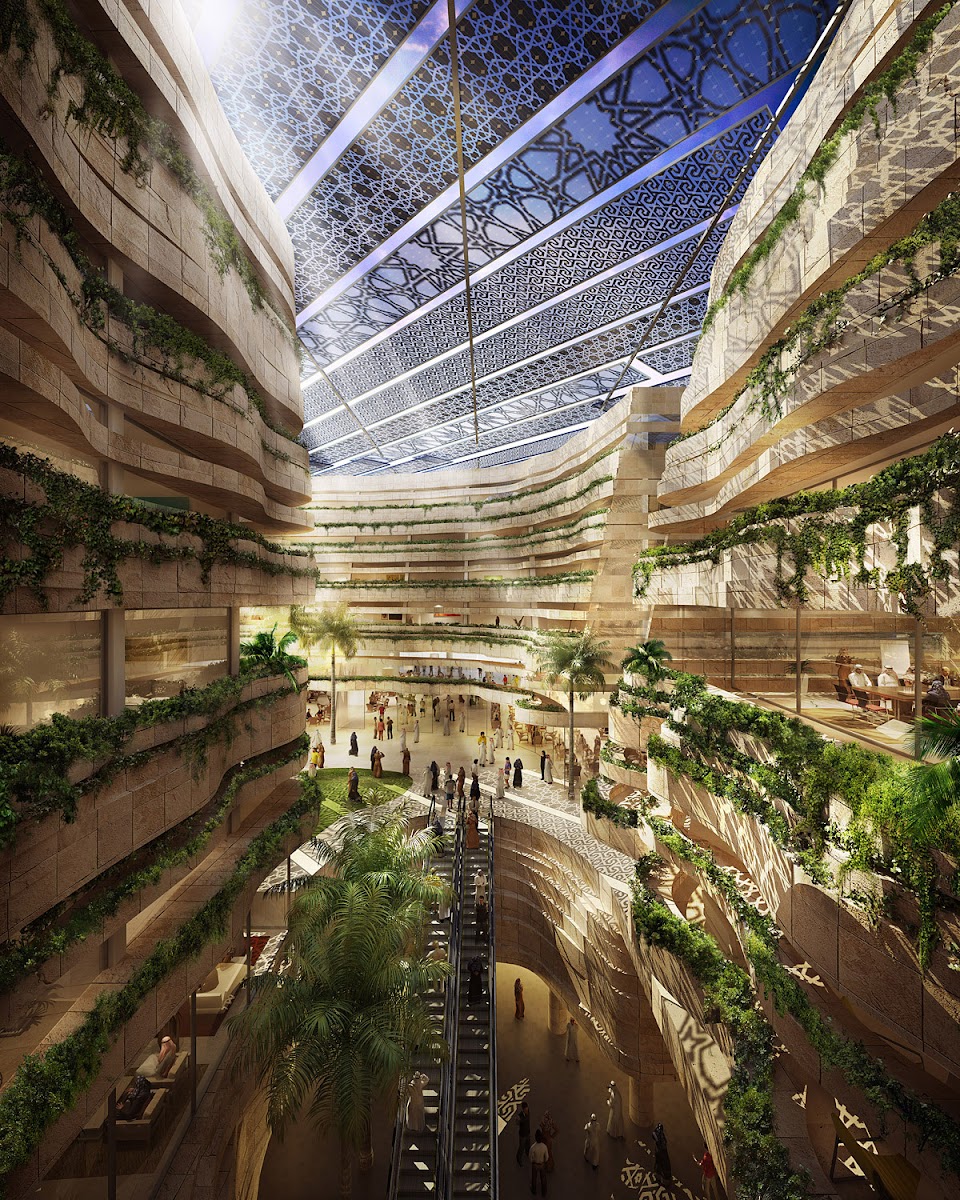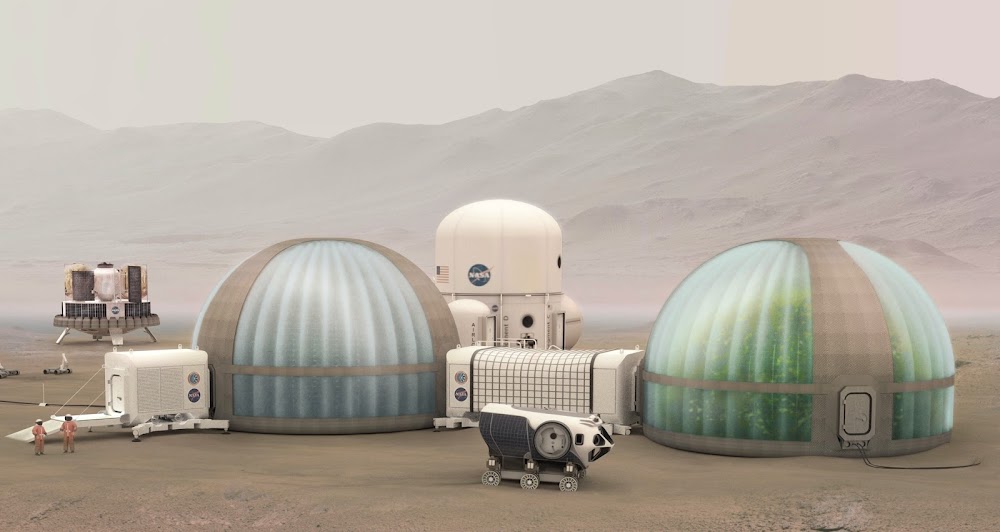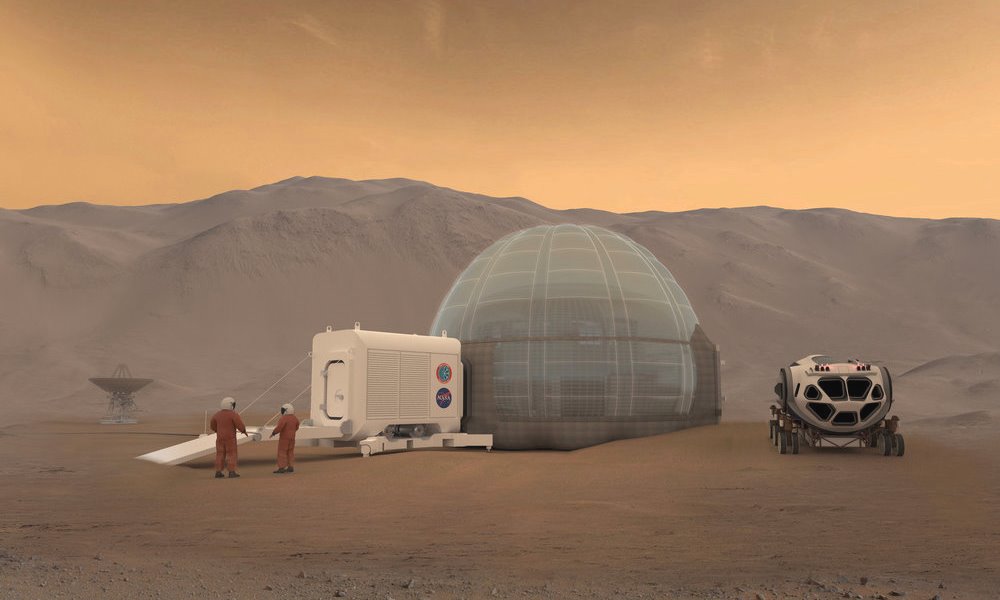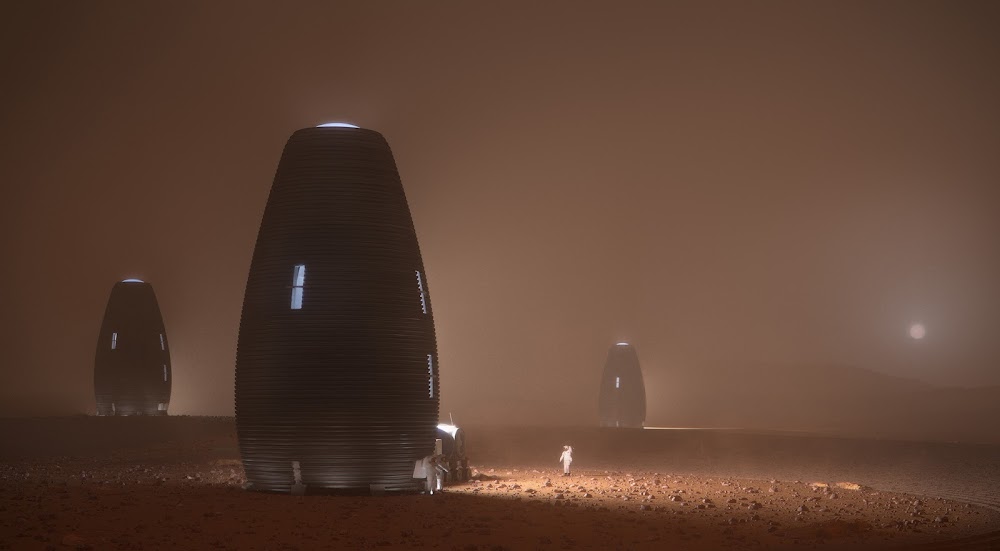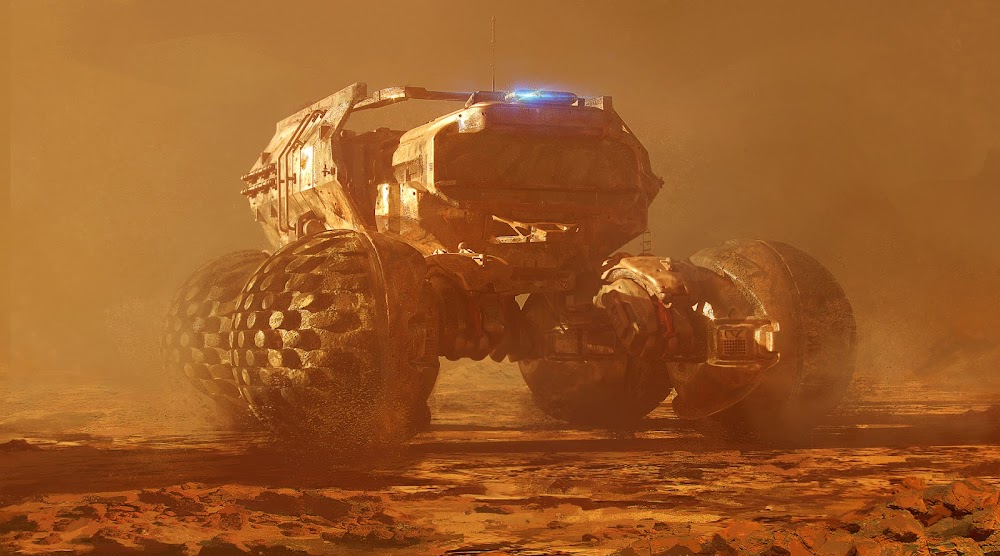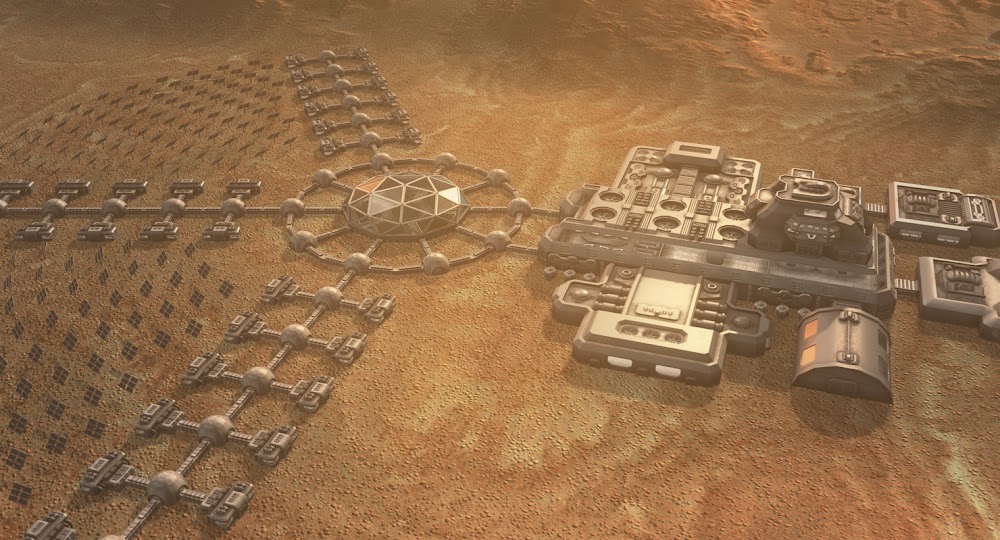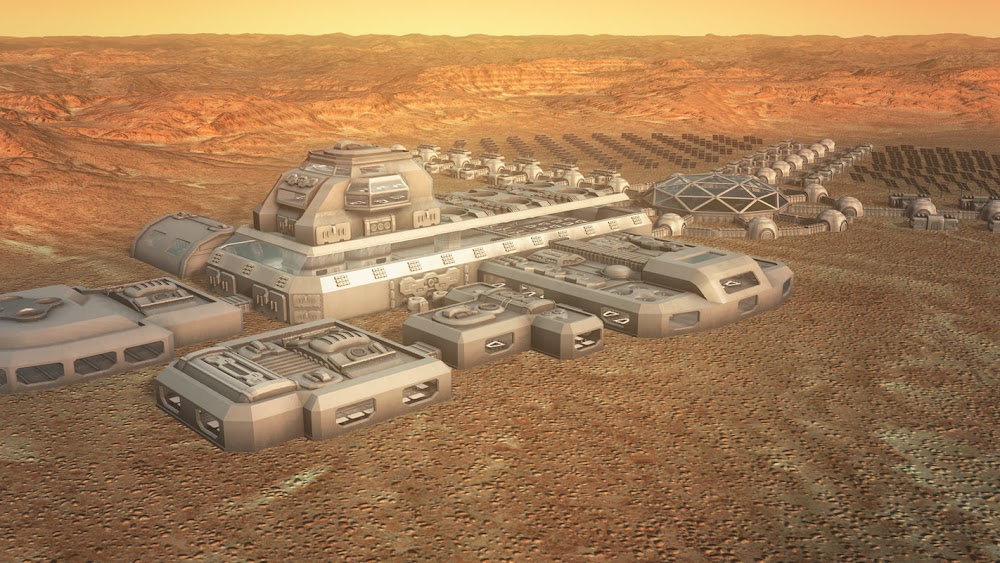To survive on Mars longterm humans will need to live off the land (a practice in space exploration called In Situ Resource Utilization or shorter ISRU), so we will need to extract, process and store local resources of the planet. Here is William Black's artistic vision of building an industrial complex on Mars at Syria Planum, located south from Noctis Labyrinthus. More of his space concept art here.
Saturday, July 6, 2019
Thursday, July 4, 2019
Mars colony in artificial, domed canyon
Picture of the Day 4/7/2019 - design of what could be a human colony in a narrow, artificial, domed canyon on Mars by LAVA architects. This image was done for a design of Masdar City (next to Abu Dhabi, United Arab Emirates) - a futuristic sustainable city project in development and intended to be a hub for cleantech companies.
Tuesday, July 2, 2019
Mars Ice Home concept by NASA, SEArch+ & Clouds AO
Mars Ice Home is a feasibility study conducted at NASA Langley Research Center in 2016 in collaboration with human-centered space design studio SEArch+ and architects from CloudsAO. Responding to the problem of galactic cosmic radiation being the most significant issue for human health on long duration Mars surface missions, the concept incorporates in situ resource utilization derived water-ice for radiation shielding and as a structural component.
Water, a hydrogen-rich material, is an excellent shielding material for galactic cosmic rays – and many areas of Mars have abundant water ice just below the surface. The Ice Home concept balances the need to provide protection from radiation, without the drawbacks of an underground habitat. The design maximizes the thickness of ice above the crew quarters to reduce radiation exposure while also still allowing light to pass through ice and surrounding materials. The water-ice fills and freezes within cellular pockets of the precision-manufactured inflatable membrane. The interior of the habitat would be insulated from the ice with a cellular layer of carbon dioxide, which can easily be extracted from the Martian atmosphere.
Water, a hydrogen-rich material, is an excellent shielding material for galactic cosmic rays – and many areas of Mars have abundant water ice just below the surface. The Ice Home concept balances the need to provide protection from radiation, without the drawbacks of an underground habitat. The design maximizes the thickness of ice above the crew quarters to reduce radiation exposure while also still allowing light to pass through ice and surrounding materials. The water-ice fills and freezes within cellular pockets of the precision-manufactured inflatable membrane. The interior of the habitat would be insulated from the ice with a cellular layer of carbon dioxide, which can easily be extracted from the Martian atmosphere.
Sunday, June 30, 2019
3D-printed Mars habitat MARSHA by AI SpaceFactory
Architectural and technology design agency AI SpaceFactory is the team that won NASA’s 3D-Printed Habitat Challenge for Mars. Their design "MARSHA" of an egg-shaped, dual shell habitat is a principal rethinking of what a Martian habitat could be - not another low-lying dome or confined, half-buried structure but a bright, multi-level, corridor-free home that stands upright on the surface of Mars.
Here are some impressive conceptual design images for the project:
Here are some impressive conceptual design images for the project:
Thursday, June 27, 2019
NatGeo's MARS TV series: drama part of full season 2
Most of the criticism against National Geographic Channel's MARS TV series is related to the concept of joining drama with documentary. In a result the viewer can't fully enjoy any of the two parts without interruptions from the other part every few minutes. So here you can watch only the drama part of full season 2 of the show without documentary cut-ins.
In season 1 the series depicted first human mission to Mars and hardships of building a base on Mars in a lava tube. Season 2 is digging deeper into the challenges of life on Mars, covering everything from the first Martian-born baby to surviving the common cold to the first commercial efforts by Lukrum Corporation to exploit the planet's resources.
In season 1 the series depicted first human mission to Mars and hardships of building a base on Mars in a lava tube. Season 2 is digging deeper into the challenges of life on Mars, covering everything from the first Martian-born baby to surviving the common cold to the first commercial efforts by Lukrum Corporation to exploit the planet's resources.
Watch full episodes of the show here:
Tuesday, June 25, 2019
ESA's base on Mars by Martin Kornmesser
Picture of the Day 25/6/2019 - Concept image of European Space Agency's (ESA) base on Mars by German graphic designer Martin Kornmesser.
Friday, June 21, 2019
Mars exploration rover by Sergii Golotovskiy
Picture of the Day 21/6/2019 - Mars exploration rover in a sandstorm by Polish concept artist Sergii Golotovskiy. More of his art here.
Tuesday, June 18, 2019
Mars colony concept by Dmitry Azarov for National Geographic's MARS TV series
Russian 3D artist Dmitry Azarov has made some concept renders of human colony on Mars for National Geographic's "MARS" TV series (season 3 ?). More of his art here.
Sunday, June 16, 2019
Mars exploration rover and drones by Paul Canavan
Picture of the Day 16/6/2019 - Painting of Mars exploration rover and drones by British fantasy artist Paul Canavan. More of his art here.
Monday, June 10, 2019
Underground atrium on Mars by Vincent Callebaut
Picture of the Day 10/6/2019 - design of what could be an interior view of an underground atrium on Mars by French eco architect Vincent Callebaut. This image was done for a design project "Wooden Orchids" of an eco-responsible shopping mall in Ruichang, China.
Subscribe to:
Comments (Atom)

